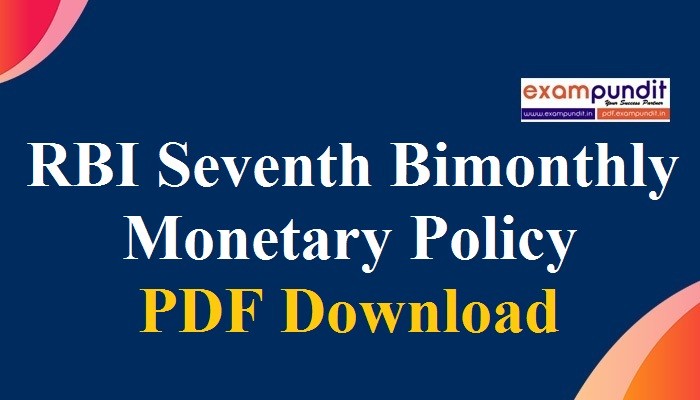RBI Governor Statement on Seventh Bimonthly Monetary Policy:
Introduction:
From the careful evaluation of the current macroeconomic and financial conditions, RBI Governor Shaktikanta Das said that the Monetary Policy Committee has decided to advance its meeting which is scheduled to be held on 31st March, 1st and 3rd April 2020. It met on 24th, 26th and 27th March for extensive discussions on the changes to be made due to COVID-19 Pandemic.
Highlights of the Meeting:
- The Monetary Policy committee decided to reduce policy repo rate and for maintaining the accommodative stance of monetary policy to revive growth, mitigate the impact of COVID-19 in order to maintain the inflation within the target.
The revised rates are as follows:
| Policy rate | Changes From | Changed To | Change in Basis points(bps) |
| Policy Repo Rate | 5.15% | 4.4 % | 75 bps |
| Reverse Repo Rate | 4.90% | 4% | 90 bps |
| Marginal Standing Facility Rate | 5.40% | 4.65 | 25 bps from Policy Repo Rate |
| Bank Rate | 5.40% | 4.65 | 25 bps from Policy Repo Rate |
| CRR | 4% | 3% | 100bps |
| SLR | 18.25% | 18.25% | No change |
Turning to growth in India, the implied real GDP growth of 4.7 per cent for Q4:2019-20 in the second advance estimates of the National Statistics Office, released in February 2020, within the annual estimate of 5 per cent for the year as a whole is now at risk from the pandemic’s impact on the economy.
- Banks and other financial institutions should do all they can to keep credit flowing to economic agents facing financial stress on account of the isolation that the virus has imposed
- RBI is going to inject Rs.3.74 lakh crore liquidity into the system.
- All lending institutions like commercial banks, NBFCs are being permitted to allow 3month moratorium period on the payment of term loan outstandings.
- In respect of working capital facilities sanctioned in the form of cash credit/overdraft, lending institutions are being permitted to allow a deferment of three months on payment of interest in respect of all such facilities outstanding.
- The accumulated interest for the period will be paid after the expiry of the deferment period. Such Deferment is not to be considered for NPA.
- Minimum daily CRR balance is to be reduced from 90% to 80% till 30th June 2020.
- Indian banks are not permitted to participate in Offshore Indian Rupee Derivative Market eventhough the benefits of their participation in the Non Deliverable Forward market have been widely recognised.
- Slump in crude oil prices for India and food grains prices may soften further on back of record production.
- All measures are to be taken without affecting credit history
Conclusion:
By considering the fact that the macroeconomic fundamentals of the Indian economy are sound and stronger than what they were in the consequences of the global financial crisis – the fiscal deficit and the current account deficit are now much lower, inflation conditions are relatively benign; and financial volatility measured by change in stock prices from recent peaks and average daily change in the exchange rate of the rupee is distinctly lower.
Download Seventh Bimonthly Monetary Policy PDF
THE COMPLETE Static GK Capsule for Upcoming Exams
Check Here for Last 6 Months Current Affairs PDF
Click Here for More Expected Monthly Current Affairs Questions
Monthly Current Affairs PDF 2020– Click Here to Download
Monthly One Liner Current Affairs PDF – Download Now
Click Here to Join Our What’s App Group & Get Instant Notification on Study Materials & PDFs
Click Here to Join Our Official Telegram Channel





